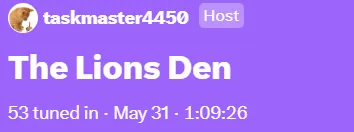
Threadcast link:
@taskmaster4450le/re-leothreads-os72mwvp
Link to recording:
https://twitter.com/i/spaces/1nAKEaLWmRvKL
Speakers
DISCLAIMER: The following has been generated by AI (Claude-3) based on the publicly available recording of the livestream. Because the content is AI generated it may contain errors, so please keep that in mind when reading. Feel free to suggest corrections and/or add additional information/improvements in the comments. Read more: Introduction post for the AI Summaries project
In this episode of the Lion's Den, SimpleGame joined the discussion to provide an in-depth look at his latest initiative, which is bringing a new approach to NFTs and gaming on the Hive blockchain.
Layer 1 NFTs on Hive
SimpleGame began by announcing that layer one NFTs are now live on Hive. This is a significant development, as the system they have built goes beyond just gaming applications. The key advantage is that all the NFT data is stored directly on the Hive blockchain as human-readable text, rather than relying on off-chain databases or smart contracts.
Leveraging LeoAI for NFT Analytics
One of the standout features of this new system is its integration with LeoAI. SimpleGame explained that LeoAI will be able to directly read the blockchain data to provide comprehensive analytics on NFT sales, pricing, and other key metrics. This eliminates the need for developers to build their own leaderboards, marketplaces, and reporting tools.
Upgrading and Evolving NFTs
Another innovative aspect is the ability for NFTs to be upgraded and modified over time. The controlling account for a collection can make changes to the attributes of NFTs, allowing for new capabilities to be added. This gives NFT holders the ability to enhance their items through gameplay or other means, increasing their value.
Onboarding New Projects
SimpleGame also discussed the process for onboarding new projects onto the system. While the core NFT data is publicly accessible, projects need to be whitelisted to utilize the APIs and front-end tools provided. This ensures a level of quality control and compatibility within the ecosystem.
Transitioning from "Play-to-Earn" to "Play-to-Own"
A key philosophical difference SimpleGame highlighted is the shift from a "play-to-earn" model to a "play-to-own" approach. He believes that true digital ownership, where players maintain control of their in-game assets even if a game shuts down, is the future of web3 gaming. This contrasts with the current landscape of centralized databases and smart contracts that can limit user ownership.
Integrating with LEO
In terms of the Leo integration, SimpleGame shared plans to provide discounts on marketplace transaction fees for Leo premium members. Additionally, the team is exploring the idea of creating an NFT that grants Leo Premium status to holders. They are also automating upvote rewards for NFT holders and game participants to further incentivize the Leo community.
The Path Forward
As SimpleGame concluded, he emphasized the importance of building a strong community of "true owners" rather than just focusing on user acquisition. He believes that by empowering players with genuine digital ownership, the ecosystem will organically grow and thrive in the long run. The team is committed to continuously improving the system and onboarding new projects to showcase the power of their approach to web3 gaming.
@leoglossary links added using LeoLinker.